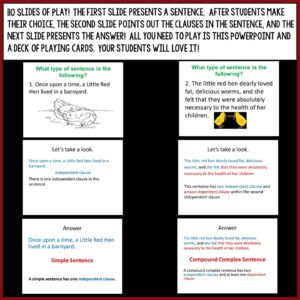Simple, Compound, Complex Sentences Review Game
We just finished playing our simple, compound, complex sentences review game in my seventh grade ELA class, and my students had a blast! Have you ever noticed that you can teach a concept over and over, but some students just refuse to pay attention? When this happens, playing a review game can really help. We have been working on learning the different types of sentences all year, but today on February 19th, we were finally ready for some game playing action, and magically, my students finally cared enough to figure out the difference between a compound and a complex sentence.
Before you are ready to play this simple, compound, complex sentences review game with your students, you must have taught the different types. Teaching the types of sentences (simple, compound, complex) is no easy task. There are many steps to the process. First, students must understand subjects and verbs, and then they must be able to identify the types of clauses – independent and dependent. Once this groundwork is completed, it still takes time for them to figure out what type of sentence they are reading or writing. After you have drilled it and taught it until you’re blue in the face, change things up and try this simple, compound, complex sentences review game. Those students who get that glaze over their eyes when any type of grammar instruction is taught will perk up and pay attention, and I guarantee you that your students will beg you to play again!
Materials you will need:
Decks of cards (You can buy them at the dollar store. We found two packs for a dollar there.)
A PowerPoint with different types of sentences.
Object
Students will earn points by correctly identifying sentences (presented in a PowerPoint) as simple, compound, complex, or compound complex.
How to Play
Students will draw a card and earn the points presented on the card if they correctly identify the type of sentence.
Numbered cards = that number of points
• Ace =fourteen points
• King= thirteen points
• Queen = twelve points
• Jack = eleven points
• Jokers = Double or nothing
Note: If a player draws a joker, he/she must draw the next card on the deck. The sentence is now worth double the amount on the second card. If the student correctly identifies the sentence type, he/she earns the double point value. Here is the kicker though, and part of what makes this game so fun. If he/she misidentifies the type of sentence, he/she loses all of his/her points so far in the game and must start over at zero. That’s why we call the game “The Joker”. It’s a game of luck and a game of knowing your ELA stuff! If you draw a joker, it’s all or nothing with the next sentence, so students know they better get it right!
So students place this card face up on their desks. Then, the teacher shows the first sentence on the PowerPoint presentation. Students read the sentence to themselves and decide if it is a simple, compound, complex, or compound complex sentence. Once a desired amount of time passes for the teacher, he/she will instruct for pens to be put down and then he/she will explain the sentence by pointing out the clauses. After an explanation, the answer will be given. If students chose the correct answer, they earn the amount of points shown on the card. If they got it wrong, they earn zero points for that round. Next, new cards are given out and the game continues. The jokers can hit at any moment, which adds excitement! Everyone wants to know when someone ends up with a joker and everything is on the line!
This simple, compound, complex sentences review game can be played in small groups or as a whole class. You can download our directions here for free and make up your own sentences, or buy our PowerPoint for only $5 and have all of the work done for you!
In our PowerPoint, there are three slides per round. The first slide will give a sentence. The second slide highlights the clauses (independent and dependent) in the sentence but does not yet give the answer. This way, you can use this slide to give hints if needed or to make sure students are paying attention before you give the answer. This is what makes this game an incredible teaching tool! The third slide in the set will give the answer. At this point, students give themselves their points if they answered correctly. Then, the next round begins. There are 110 slides in this PowerPoint, enough for several class periods of play! All types of sentences are used. Also, full directions and student answer sheets are provided. You can save this simple, compound, complex sentences review game, and use it for years to come!
Happy Teaching!
Shannon






